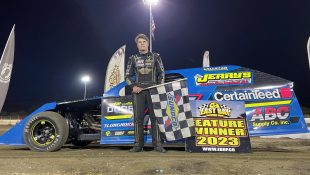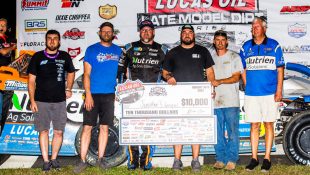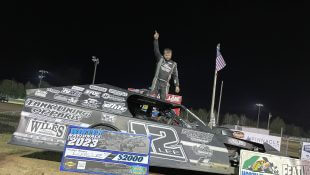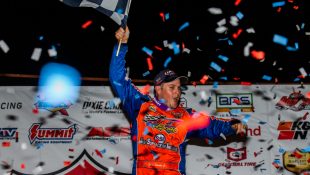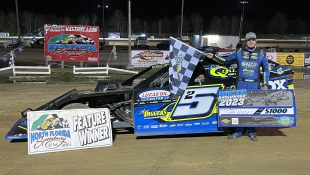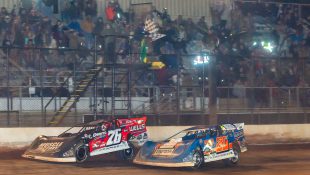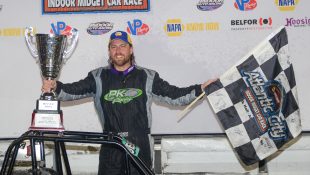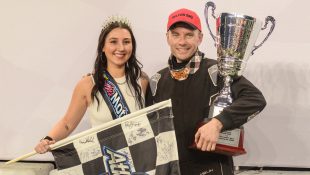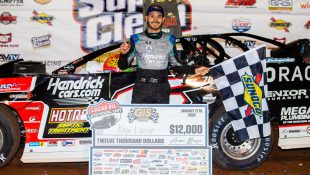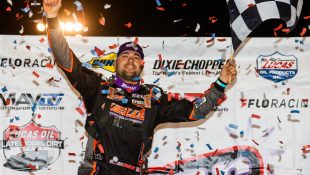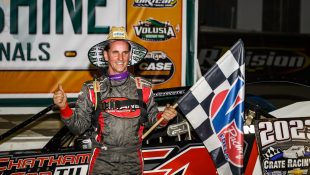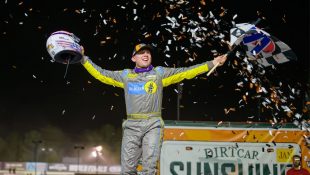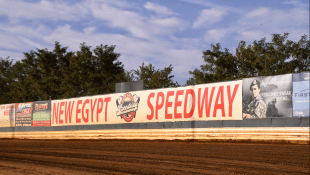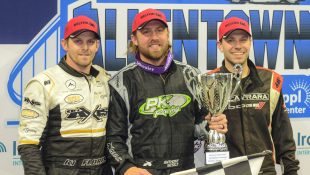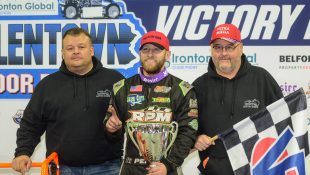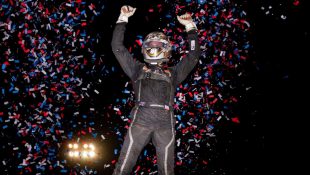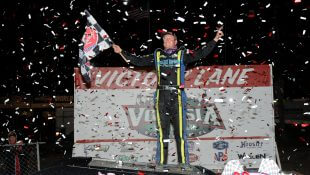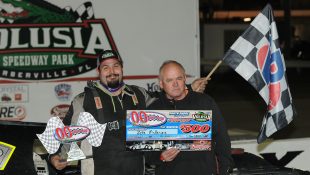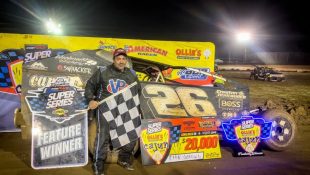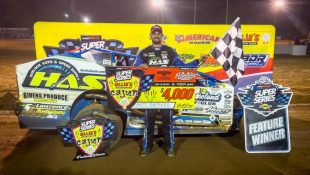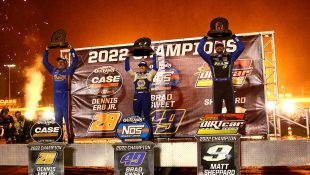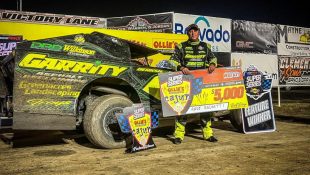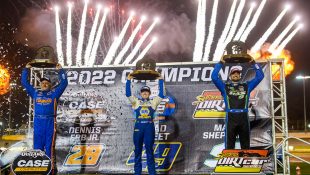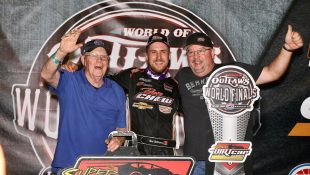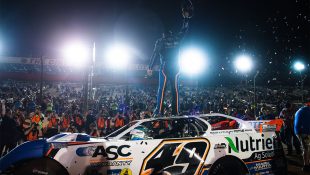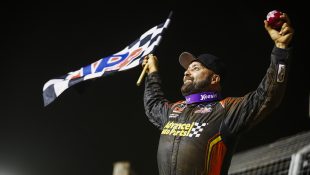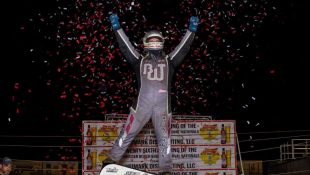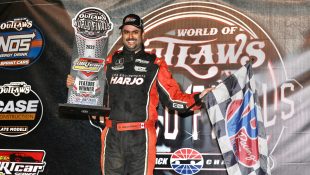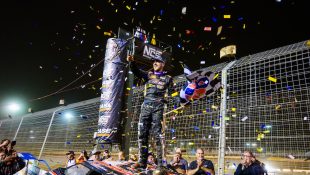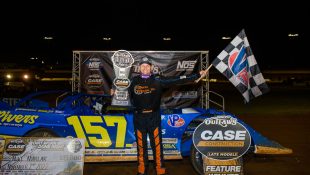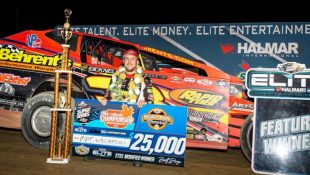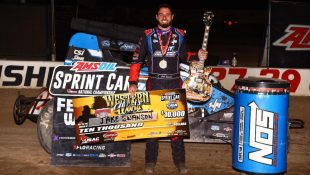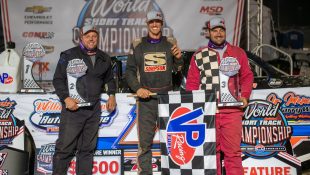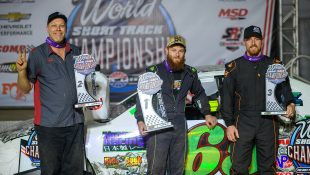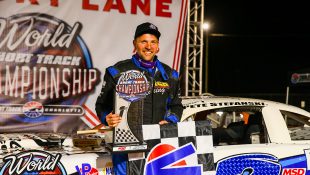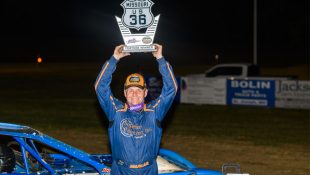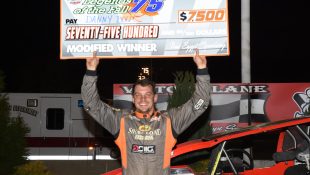From Journeyman to Homebody, Albany-Saratoga Speedway Promoter Lyle DeVore is Living His Childhood Dream
Story By: MATT NOLES / RACERSGUIDE.COM
Photos By: DAVE DALESANDRO / RACERSGUIDE.COM
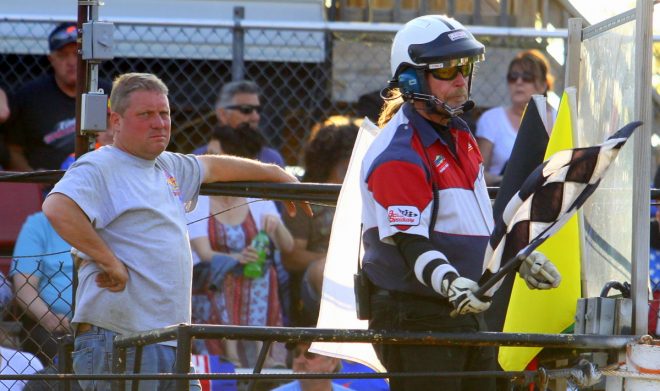 SPRAKERS, NY- March 8, 2017- The truck made a telltale sound as it pulled into the drive. A sound that had become unmistakable over the years and on this Friday afternoon, a sound that was more like music to the ears of one young boy in particular.
SPRAKERS, NY- March 8, 2017- The truck made a telltale sound as it pulled into the drive. A sound that had become unmistakable over the years and on this Friday afternoon, a sound that was more like music to the ears of one young boy in particular.
The rattle of masonry tools and the dust of mortar followed the older man into the house as he brushed off yet another busy day of work and headed for the couch to relieve some of his weariness. The young boy had no other choice but to wait both patiently and impatiently at the same time for the hours to pass. It was a task far easier said than done.
Thus was the Friday afternoon ritual for young Lyle DeVore. A man who would go from fitting into a crowded room with ease to standing out on the national stage as one of the premier promoters in dirt racing. Yet like most, his story is filled with twists and turns; partnerships and loss and above all else, the refusal to lose sight of his childhood dream. It’s Americana in the purest of forms.
DeVore’s racing career started much like everyone else’s did; in the grandstand as a spectator. “It all started with my father who used to bring me to the races when I was a little kid,” said DeVore. “This was back when Albany-Saratoga [Speedway in Malta, New York] was still asphalt. I would end up falling asleep before the feature started sometimes but I fell in love with racing from an early age.”
It didn’t take long for DeVore to emulate his father in many aspects; one being who he would cheer for on those remarkable Friday nights of his youth. “My father cheered for a guy named C.D. Coville,” He recalled. “So, like father, like son, I picked up on his excitement in everything when it came to racing including who I cheered for.”
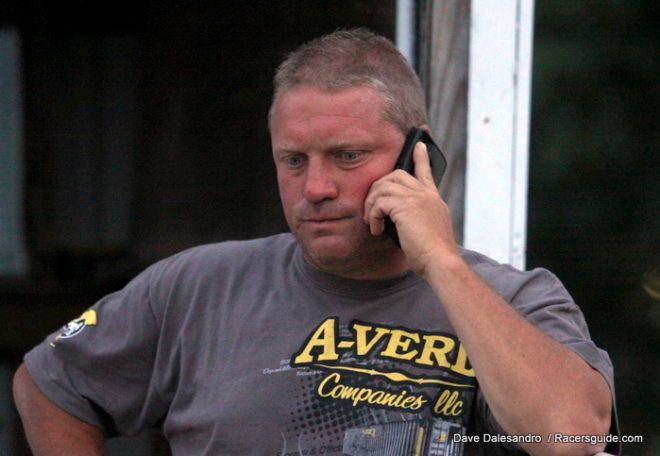 As time went on, and his interest in the sport of racing grew, it seemed an almost natural progression that DeVore would become more involved with his home track and when he did, he ended up immersing himself in the stories and lore that followed. However, his first step towards prominence started at the very bottom of the proverbial totem pole. Needless to say, whether he knew it at the time or not, his future had been written in stone.
As time went on, and his interest in the sport of racing grew, it seemed an almost natural progression that DeVore would become more involved with his home track and when he did, he ended up immersing himself in the stories and lore that followed. However, his first step towards prominence started at the very bottom of the proverbial totem pole. Needless to say, whether he knew it at the time or not, his future had been written in stone.
“I remember one night I was at the track and someone came up to me and asked me if I’d like to work on Saturday mornings,” continued DeVore. “I decided I would do it and my mother would drop me off at six o’clock and I would pick up all the garbage around the speedway with a bunch of other kids. I was seven-years-old.”
DeVore didn’t just become one of the track garbage men that first season working at the fabled Malta, New York oval; he also became part of the track maintenance crew; in a manner of speaking.
“C.J. [Richards] came up to us after we were done picking up garbage and he asked us if we were ready to go to a rock concert,” DeVore said with a chuckle. “We didn’t know what he was talking about until we were out on the track picking rocks up off of it. I learned and gained a lot of respect from him and that was more or less how I got involved.”
Like many aspects of racing, as the season went on, the group of Saturday morning workers dwindled down until DeVore was the last member left standing at the end of the year. For his efforts, which did not go unnoticed by the Richards family, DeVore was awarded with tickets to go to other races. For a young race fan, nothing could have been better.
“Even though it was a miniscule job you felt pretty cool about the fact that you were getting into the races for nothing because you worked there,” DeVore stated. “Because I didn’t quit, that job evolved into helping with handicapping and then becoming a regular summertime gig between Malta and Devil’s Bowl [Speedway in West Haven, Vermont].”
While some in their younger years dreamed of being an astronaut or even something more fantastic than that, young Lyle DeVore had dreams that were unheard of to most guidance counselors.
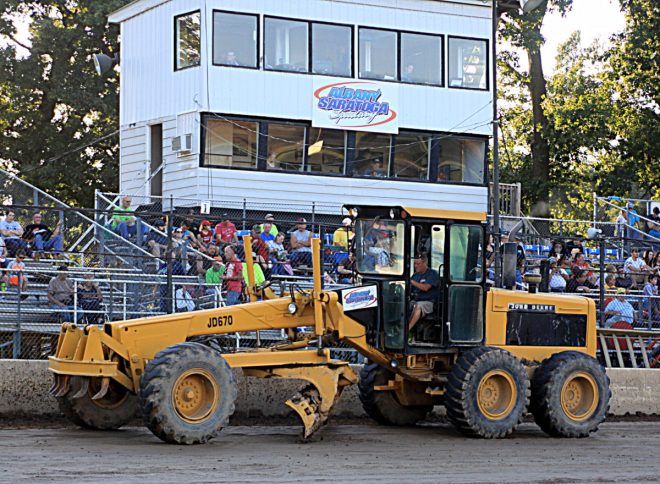 “When I was in middle school, the guidance counselor asked me what I wanted to do,” said DeVore. “I said ‘well, I want to run race tracks.’ He looked at me like I had lost my mind. He couldn’t understand why I didn’t want to be a fireman or a police officer. I wanted to run race tracks but they [the guidance office] didn’t have a clue what that was about. So he just kind of nodded his head and said ‘next.’ They just didn’t get it.”
“When I was in middle school, the guidance counselor asked me what I wanted to do,” said DeVore. “I said ‘well, I want to run race tracks.’ He looked at me like I had lost my mind. He couldn’t understand why I didn’t want to be a fireman or a police officer. I wanted to run race tracks but they [the guidance office] didn’t have a clue what that was about. So he just kind of nodded his head and said ‘next.’ They just didn’t get it.”
After throwing himself head-first into the business of racing, DeVore was finally ready to take the next step; more of a half-step really. “I think the first time I ever ran a grader I was 15-years-old,” He recalled. “I started off by grading the dirt off the banking and up to the track. I wasn’t ready to get on the track quite yet.”
Where today’s youth seemingly has everything handed to them, including knowledge, DeVore’s first attempt at operating heavy equipment was very much trial and error. “I was really nervous running that grader,” He continued. “I more or less learned it all by myself. I never had anyone to teach me. I just jumped in and learned the controls and did it. It was an interesting experience.”
Though he had earned his stripes, the young man from upstate, New York found himself at another institution of higher education; Le Moyne College in Syracuse. Even so, he was never far from his beloved dirt track either in mind or body. “I went to Le Moyne and earned a four-year degree in Business,” DeVore said. “But I would always come home and work at the track whenever I had the opportunity.”
After college, the newly minted graduate decided to take a summer off to travel. Not to Europe nor the Caribbean nor some other exotic place barely discernable on a map. Instead, he packed up what he could carry into his pickup truck and hit the road to see as many races at as many race tracks as he possibly could. This marked the beginning of his study in the art of speedway management. It was a road that would lead him to his master’s degree.
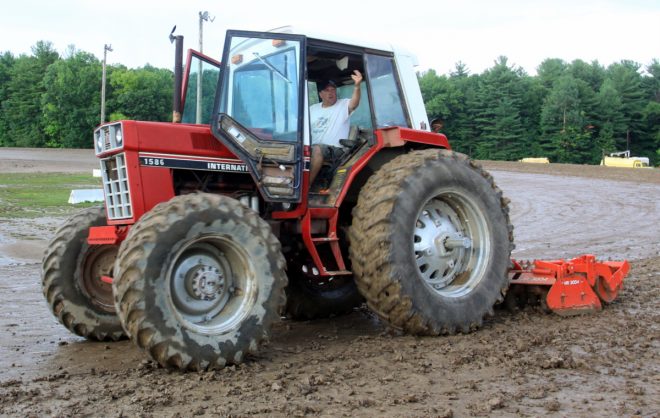 “I went across the country and went to all the race tracks that I had ever wanted to go to,” stated DeVore. “I wanted to see what they were about. I would take pictures of equipment and concession signs; every facet of the business. I slept primarily in the bed of my pickup truck. I saw some of the best racing I have ever seen in my life; met some of the best people and it was such a gaining experience. It really set the stage for what I wanted to do.”
“I went across the country and went to all the race tracks that I had ever wanted to go to,” stated DeVore. “I wanted to see what they were about. I would take pictures of equipment and concession signs; every facet of the business. I slept primarily in the bed of my pickup truck. I saw some of the best racing I have ever seen in my life; met some of the best people and it was such a gaining experience. It really set the stage for what I wanted to do.”
In the winter of 1993, after the best summer of his young life, DeVore flew out to Reno, Nevada to go to the promoter’s meetings. It was there that he would take the next logical and somewhat largest step of his promotional career.
“I met up with Alex Friesen and we went to a resort out in Lake Tahoe,” recalled DeVore. “I couldn’t ski but I said that I could because, well, it was Alex Friesen. Luckily, the winter was weird that year and you couldn’t ski but we hung out and spent some time together. The experience turned out to be life-altering.”
Two weeks after DeVore returned from his trip to the west coast, his phone rang. Call it destiny, call it fate if you will, but on the other end of the line was none other than Alex Friesen. From this point on, life would never be the same.
“He asked me if I would be interested in coming out to his tracks and working with him,” DeVore continued. “He had Ransomville [Speedway in Ransomville, New York] and Lancaster [National Speedway in Lancaster, New York] and I went out there and he had this little go-kart track and he wanted me to run that and help out at Lancaster. I said ‘fine,’ and then everything just started to roll.”
Not only did DeVore move up to working at both Ransomville and Lancaster full-time but he and Friesen ran satellite events at Grandview [Speedway in Bechtelsville, Pennsylvania], the Williams Grove Speedway [in Mechanicsburg, Pennsylvania] and they were also involved with Afton [now I-88 Speedway in Afton, New York] and the Mahoning Valley Speedway [in Lehighton, Pennsylvania]. Needless to say, DeVore’s life was all about racing and promoting and little else simply because there was no room to fit anything else in.
“As if we weren’t busy enough, we decided to take over Fulton [Speedway in Fulton, New York] and Utica-Rome [Speedway in Vernon, New York],” laughed DeVore. “He ended up staying in Buffalo while I moved closer to Fulton and Utica-Rome. We continued to run all of the other races and those two tracks for 3 or 4 years until he passed away after his accident in 1996.”
DeVore looks back at his time with his friend with equal amounts of joy and sadness. Joy in the sense of all they accomplished together and sadness with the way their friendship was cut tragically short.
“Alex was one of a kind,” DeVore said with a touch of sadness. “He had a different mentality of anyone I have ever seen. He put good people in good positions and motivated you like nobody else ever could. He just wanted you to go do your job; he didn’t want to micromanage or interfere. He didn’t want you to talk to him about it, he just wanted you to do it; make it happen.”
Case in point, one night at Utica-Rome, the health department was at the speedway hours before the gates were scheduled to open and there were issues with the water quality. Essentially, the speedway was shutdown effective immediately. Well, that didn’t sit well with Friesen and DeVore bore the brunt of the responsibility for ‘figuring it out.’
“So I called him [Alex] up and I told him what the health department said,” recalled DeVore. “He was getting ready to run a drag race out at Lancaster and he said ‘you know what, you better figure it out.’ And that was that. Click; the phone went dead. I called the health department back, worked out all the problems and we opened up on time. Like I said, he motivated you and forced you to use your mind; to figure out the problems and deal with them. That really helped me to mature and grow in the sport. He was something else.”
Over their tenure together, DeVore and Friesen became best friends while operating numerous speedways throughout the northeast and Pennsylvania. Though Alex’s passing undoubtedly hit him hard, DeVore continued the day-to-day operation with another member of the famed Friesen family; Stan.
“I had always been close with Stan Friesen,” said DeVore. “So we continued to run the tracks but eventually the relationship with our other business partner had deteriorated so we decided that it was time to move on. It was a difficult decision given everything that Alex [Friesen] and I had done together, but it was the right choice in the end.”
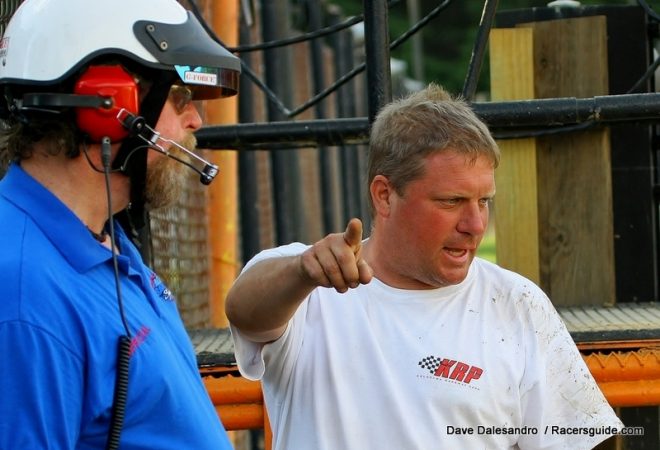 It’s funny how when one door closes, another one opens. However, in this instance, another door re-opened in the form of his old boss, and mentor, C.J. Richards. “When Stan and I parted ways, C.J. called me up and asked me if I’d like to come back,” DeVore said. “So I went back to work with the Richards family and stayed with them for two more years.”
It’s funny how when one door closes, another one opens. However, in this instance, another door re-opened in the form of his old boss, and mentor, C.J. Richards. “When Stan and I parted ways, C.J. called me up and asked me if I’d like to come back,” DeVore said. “So I went back to work with the Richards family and stayed with them for two more years.”
Though he was undeniably happy to return home, DeVore still wasn’t ready to plant roots and stay in one spot; at least not yet. As it had occurred nearly a decade before, fate yet again intervened in the form of a phone call. This time on the other end of the line was none other than area businessman, and Lebanon Valley [Speedway in West, Lebanon, New York] owner, Howard Commander.
“Howard called me on the phone and I went down there and spoke with him,” recalled DeVore. “And that started the whole relationship with Howard in 2000. Between him, Alex Friesen and C.J. Richards, I learned a lot about the business of running a race track; more so than I think I could have learned with anyone else honestly. They shaped me and turned me into what I am today.”
Despite all of his experience, when DeVore joined the Commander family at Lebanon Valley for the 2000 season, he found himself back at the bottom of the time-honored food chain. “I was back working on the maintenance end of everything,” He said. “But as I proved myself over the years, I gained more and more responsibility just like I had with Alex years earlier.”
Howard Commander is not a simpleton by any means and when he sees talent, he generally knows what should be done with it. “The next thing I knew, I was the General Manager of Lebanon Valley,” said DeVore. “I ended up doing all the track prep and even running the races on a Saturday night. I’ve done just about everything there is except announce and I don’t think people want to hear my voice. They hear it enough on the one-way radio as it is.”
There was only one more logical step that Lyle DeVore could possibly make; it was time for him to run a speedway of his own. At the end of the 2011 racing season, the man who started off his life in racing by picking up trash at a race track on Saturday mornings was about to get the chance of a lifetime; after all the roads he traveled and all the knowledge he gained, DeVore was finally headed back home to Malta, New York to where it all began nearly four decades earlier.
“C.J. [Richards] called Howard about leasing Malta,” stated DeVore. “And Howard asked me about it and I said ‘get in your car and let’s do it.’ Howard flat out told me that he wasn’t going to lease the speedway unless I was willing to run it. So I told him again, ‘get in the car and go meet him.’”
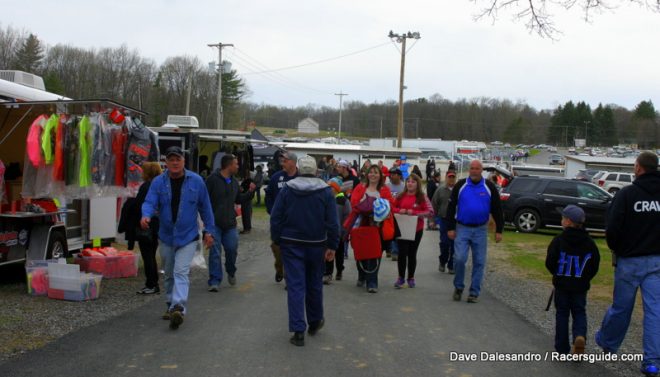 Throughout cinema history, there have been countless ‘God’ moments where a beam of light comes down and angelic voices fill the air. This period in time became exactly that for DeVore and then some.
Throughout cinema history, there have been countless ‘God’ moments where a beam of light comes down and angelic voices fill the air. This period in time became exactly that for DeVore and then some.
“Here I had gone all the way out to western New York and back,” He remarked. “My family was here, Marcy [Mangino] was here and I’m a firm believer that everything happens for a reason. I don’t understand why, but it just happens.”
The Richards family was more than a little receptive to having Howard Commander and Lyle DeVore at the reigns of their beloved speedway and after signing the obligatory paperwork, the clay went back down damn near before the ink had dried on the lease agreement. Thus Lyle became known as the ‘Man behind the Resurrection’ in the eyes and hearts of Capital District dirt fans. Yet behind the scenes, there’s someone that keeps Lyle going more so than most.
“I just thank God that Marcy handles all the stuff that she handles because I couldn’t do it,” said DeVore of his fiancé and better half. “The way that things have evolved between what she does and what I do, I think we’ve built a pretty successful business and I’m just glad that I have her with me because she polishes my rough edges and she is the voice of reason. Neither myself, nor Albany-Saratoga Speedway would be what they are without her. It isn’t just me; it’s her and all of the people that work for us.”
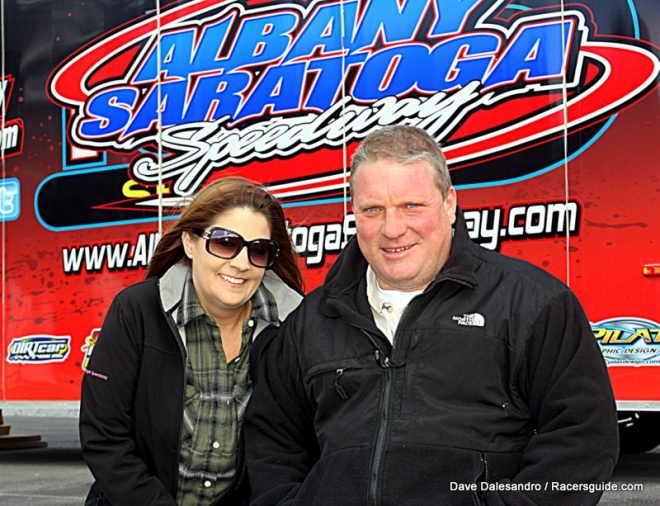 Lyle DeVore, along with Marcy Mangino, have put together one of the most successful and diverse speedway staffs in the region and they make it work. Every. Single. Week. Though he receives the majority of the credit, and rightfully so to an extent, the ‘Great Race Place’ is only known as such because of the constant hard work, dedication and innovation of everyone involved. As Alex Friesen proved over 20-years-ago; surround yourself with competent people and let them do their job.
Lyle DeVore, along with Marcy Mangino, have put together one of the most successful and diverse speedway staffs in the region and they make it work. Every. Single. Week. Though he receives the majority of the credit, and rightfully so to an extent, the ‘Great Race Place’ is only known as such because of the constant hard work, dedication and innovation of everyone involved. As Alex Friesen proved over 20-years-ago; surround yourself with competent people and let them do their job.
“I’m just glad to be home,” concluded DeVore. “Marcy’s parents work at the track, my father used to work at the track, my mother works here and so does my sister; this is home to me. Pride is the only word I can use to define my relationship with Albany-Saratoga. I was just fortunate enough that I was able to follow my dream and this place has always been it for me. Now I’m living it every week; it’s a childhood vision that has been realized.”
When the patience of the young boy from years before had finally run its course, he gently and reluctantly shook the older man lying on the couch and woke him from his sleep. As his father attempted to shake of the grogginess that inevitably followed, his son simply asked him ‘Dad, can we go to the races now?’ With a smirk and a nod of his head, the older man said ‘Yeah, we can go.’
That was the beginning of Lyle DeVore’s racing career. His father taught him to chase his dreams and to love whatever it was that he chose to do with his life. In essence, Friday night’s at the Albany-Saratoga Speedway were the beginning of not just another race fan; it was the beginning of everything.
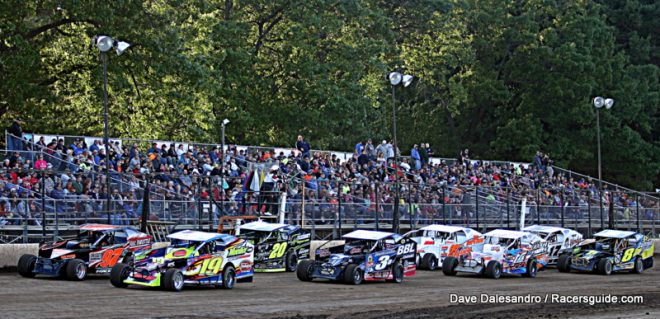
Matt Noles is a contributing writer for Racer’s Guide, Dirt Track Digest and Speedway Illustrated. He currently resides in Sprakers, New York and can be reached via e-mail at matt_noles@yahoo.com. He wrote this article in loving memory of Stanley J. DeVore.



